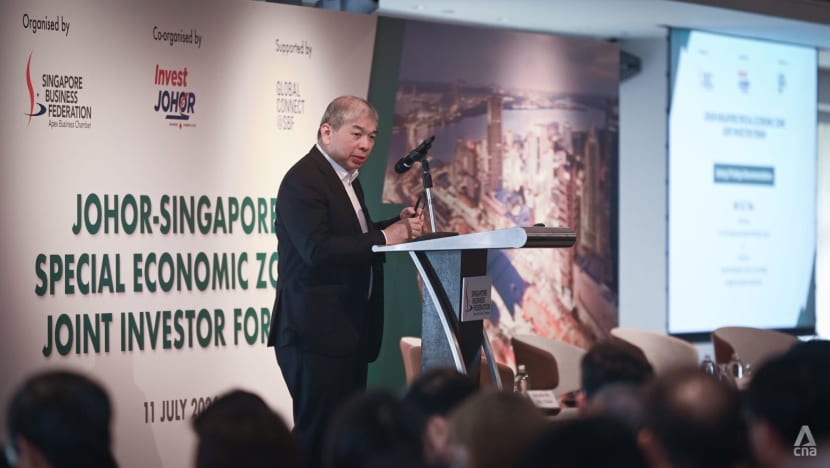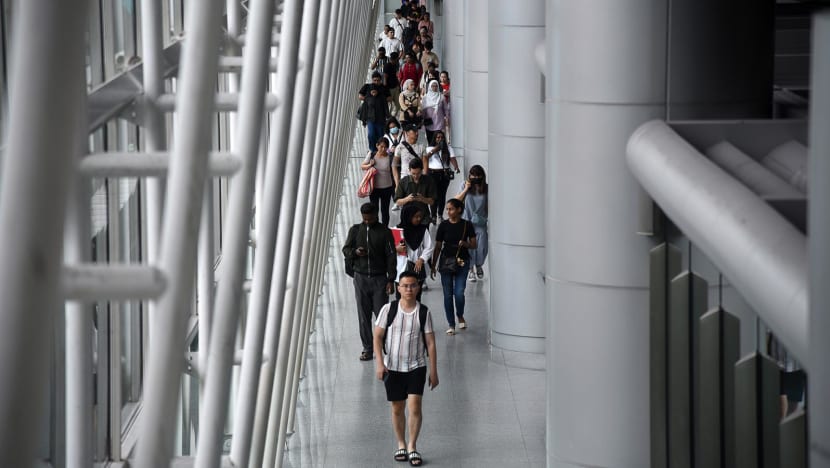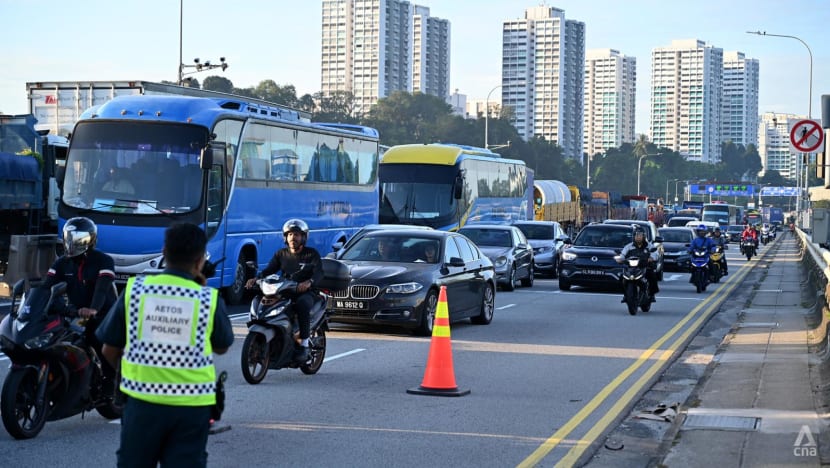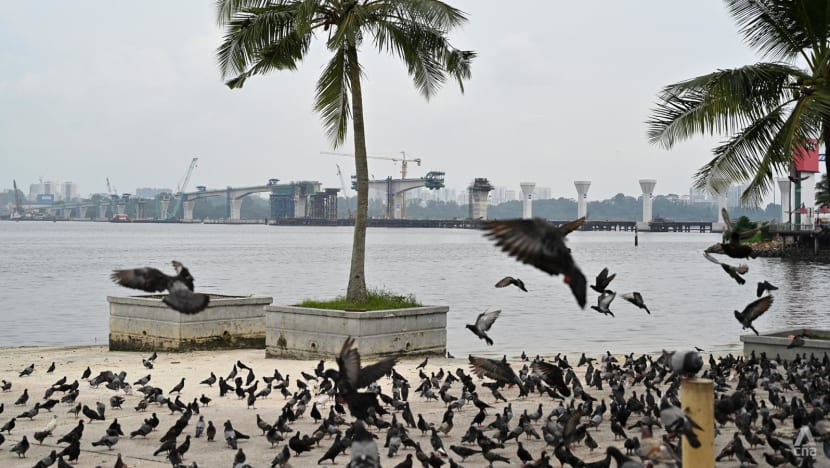Over 9 in 10 Singapore firms keen to invest in proposed SEZ in Johor, but concerns remain: SBF report
Findings of the report were released at a Johor-Singapore Special Economic Zone (JS-SEZ) Joint Investor Forum and is based on engagements with 160 Singaporean businesses across various industries.

Chairman of JS-SEZ Singapore Business Working Group (SBWG) Teo Siong Seng speaking during a joint investor forum on Jul 11, 2024. (Photo: CNA/Syamil Sapari)

This audio is generated by an AI tool.
SINGAPORE: There is overwhelming interest from Singapore businesses to set up operations and invest in Johor as part of the proposed Johor-Singapore Special Economic Zone (JS-SEZ) - with over nine in 10 firms viewing the southern Malaysian state as an attractive destination - according to a report released by the Singapore Business Federation (SBF).
However, the report outlined that most of the businesses are anticipating concerns relating to sourcing skilled and technical workers there, congestion at the land crossings delaying the movement of people and goods as well as difficulty in handling tax issues.
Findings of the report were released at a JS-SEZ Joint Investor Forum on Thursday (Jul 11) and is based on SBF’s engagements with 160 Singaporean businesses across various industries. Key findings revealed that 93 per cent of respondents view Johor as an attractive investment destination, with half of them already operating in the state.
In January, Singapore and Malaysia signed a Memorandum of Understanding (MOU) on the JS-SEZ, which is expected to offer both fiscal and non-fiscal incentives like tax breaks and easier travel between the two countries.
Malaysia’s Economy Minister Rafizi Ramli - who is heading SEZ negotiations for his country - said at an event in Kuala Lumpur on Wednesday that the signing of the agreement is on track for September, with officials from both sides “burning the midnight oil” to iron out the finer details ahead of the Malaysia-Singapore Leaders’ Retreat that month.
Speaking at the forum on Thursday, Chairman of JS-SEZ Singapore Business Working Group (SBWG) Teo Siong Seng said: "The enthusiastic response to our report clearly signals the JS-SEZ's great potential for our region. This isn't just another project - it's a potential game-changer for both Malaysia and Singapore.
“This is about more than just closer integration - it's about crafting an economic powerhouse that harnesses our complementary strengths on a sustainable basis. By bridging our economies, we're creating new opportunities that will benefit businesses on both sides of the Causeway,” he added.
POTENTIAL DIFFICULTIES IDENTIFIED
While there is optimism, the report also revealed “significant challenges” to overcome including gaps in manpower and talent shortage as well as congestion at the two land crossings.
The report found that nearly 60 per cent of the Singaporean businesses polled reported difficulties in sourcing technical and skilled workers in Johor, with additional issues in attracting Singaporean talent to work across the border.

Moreover, 61 per cent of the companies attributed the manpower crunch to employment pass issues, 58 per cent cited issues with skill-gaps in the Malaysian labour force while 21 per cent indicated salary mismatch as a factor, the report found.
To overcome this, the SBWG suggested that authorities from both sides create a “unique labour ecosystem” that leverages the strengths of the two economies - Singapore’s research and development (R&D) and management capabilities with Johor’s technical skills for execution and operations supporting various industries.
Other key proposals included developing harmonised workforce regulations, investing in each other’s workforce to enhance manpower capabilities and bridge skill gaps as well as establishing talent acquisition programmes.
Additionally, the report findings also indicated that companies have expressed the need for improved cross-border movement to facilitate the efficient transportation of people and goods.
They cited congestion at the two land crossings between Singapore and Johor as a concern, with 36 per cent of businesses engaged expressing hopes for better connectivity via a “special immigration lane for people'' to facilitate smoother travel.

The SBF report on Thursday also flagged that the movement of goods between Singapore and Johor is hindered by traffic congestion, as well as differing import tax regimes and customs procedures.
The Johor-Singapore Causeway, for one, has become one of busiest land crossings in the world, with an estimated 300,000 commuters passing through daily. And this figure is expected to grow with Singapore’s Immigration and Checkpoints Authority projecting traffic volume at the Causeway to increase by 40 per cent by 2050.
SBWG also pointed out that Johor and Singapore can draw lessons from how Chinese city Shenzhen boosted its SEZ by streamlining customs and border clearance processes with its neighbour Hong Kong by implementing a passport-free QR code clearance system and digitised cargo clearance.
QR-code immigration clearance has already kickstarted on both sides with Singapore implementing it for drivers and Malaysia giving those travelling by bus as well as motorcycles the option of using it. Malaysia’s QR-code immigration clearance, however, is a proof-of-concept testing for a three month period that began in June.
Findings highlighted in the report revealed that companies view the upcoming Johor Bahru-Singapore Rapid Transit System (RTS) Link - which is slated to be operational by end-2026 - as pivotal in addressing logistical challenges.

Yet, the businesses also suggested other improvements including the development of enhanced border crossing hubs with automated clearance using biometrics, and investing in efficient multi-modal connectivity.
Additionally, the report emphasised renewed interests within Malaysia to develop the Singapore-Kuala Lumpur High Speed Rail (HSR) project and to enhance last-mile connectivity within the SEZ.
The 350km-long HSR project, which can travel up to a speed of 350km/h, was first proposed in 2013 and led to a binding agreement inked in Dec 2016 with an aim to have the line operational by 2026.
But it was initially discontinued after multiple postponements at Malaysia's request and an eventual lapsing of an agreement in December 2020.
Malaysia paid more than S$102 million (US$76.46 million) in compensation to Singapore for the terminated project.
Talk of a resurrection of the project gained strength after Malaysia Prime Minister Anwar Ibrahim took power following the general elections in 2022 and his visit to Singapore early last year where he met with Singapore leaders.
On Aug 3 last year, then-Acting Transport Minister Chee Hong Tat said in parliament that Singapore was willing to discuss any new proposal from Malaysia for the KL-SG HSR project in good faith, “starting from a clean slate”.
Meanwhile, Singapore Prime Minister Lawrence Wong in June said that the Republic is open to new ideas - including proposals on the HSR project - at the upcoming 11th Malaysia-Singapore Leaders' Retreat later this year.
HOPE FOR STREAMLINED PROCESSES
The findings revealed that 55 per cent of businesses cited difficulties in handling tax issues, and 48 per cent of businesses indicated that more expedient cargo clearance would be crucial to enabling the efficient flow of goods.
Based on these insights, SBWG recommended implementing streamlined customs and border clearance procedures, harmonising tax and tariff policies, developing integrated transport networks and logistics infrastructure as well as enhancing digitalisation and e-commerce enablement.
The report also outlined that the current investment facilitation landscape between Singapore and Johor was fragmented and complex, with businesses reporting obstacles in obtaining necessary permits and licences.
According to the findings, 58 per cent of businesses expressed a desire for a joint investment promotion agency to market the zone and facilitate investor engagement, and 33 per cent desired a platform to facilitate collaboration and networking opportunities amongst each other for self-help and support.
SBWG recommended streamlining investment approvals and offering attractive tax incentives, developing robust legal and regulatory frameworks, providing comprehensive business facilitation services and enhancing the interoperability of financial systems.
During a panelist discussion from Thursday's investor forum, one of the participants who was representing a Singapore company expressed concern that the policies of the JS-SEZ could alter if there is a change in Malaysia's "government of the day", in reference to the country's political instability.
In response, director for Malaysian Investment Development Authority Vinothan Tulisnathzan said: "Don't worry, irregardless of whoever is the government of the day in Singapore and Malaysia, they will be pro-business."
Meanwhile, the Malaysia-Singapore Business Council (MSBC) on Thursday expressed its support for the proposed JS-SEZ.
At its joint meeting at the SBF Center in Singapore on Thursday, MSBC said that the group held discussions that were centred on advancing the mutual interests and exploring new opportunities through the development of the JS-SEZ in Johor as well as addressing challenges in the global economy.
Dr Robert Yap, executive chairman of YCH Group and a co-chair of the joint meeting, said that the proposed JS-SEZ will strengthen collaboration and drive sustainable growth between the two countries.
“We are confident that this initiative will boost regional competitiveness, create high-quality jobs, and enhance innovation.
“By leveraging our combined strengths and fostering cross-border synergies, we will build a resilient economic landscape benefiting businesses and communities, paving the way for a prosperous and interconnected future,” said Dr Yap.
His co-chair, Dr Nik Norzrul Thani, added: “The MSBC reiterates its strong support of the JS-SEZ as a driver of economic development and regional cooperation. We believe in the transformative impact of this initiative and are dedicated to fostering strong economic collaboration between Malaysia and Singapore.”
Established in 2004 to promote business and investment activities between the two countries, the MSBC said that it continues to be a “collaboration platform” for the business communities of both Singapore and Malaysia “to initiate mutually beneficial projects and explore joint opportunities”.











%20(5).jpg?itok=zM0TDBYg)











